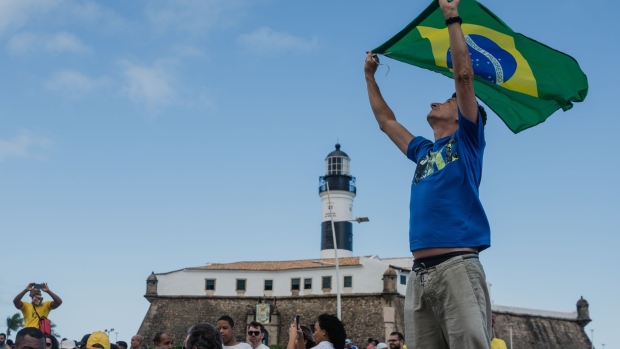Oct 2, 2022
Here’s How to Trade Brazil Assets Overseas on Election Night
, Bloomberg News

(Bloomberg) -- Investors seeking to profit from Brazil’s presidential election on Sunday will turn to Asia to place their first trades.
Brazilian President Jair Bolsonaro fought his way through to a run-off election against Luiz Inacio Lula da Silva on Oct. 30, with his leftist challenger garnering the bigger share of votes on Sunday but falling short of the outright win that some opinion polls had suggested he was on course for.
The Next Funds Ibovespa Linked ETF, a Japanese-listed exchange-traded fund that tracks the benchmark Ibovespa equity index, might be the first option for traders beginning at 8 p.m. in New York. Others include Asian stocks with Brazil exposure, such as South Korea’s Wireless Power, which got about 8% of its revenue from Latin America’s largest economy last year, and Tokyo-based agrochemicals maker Nihon Nohyaku Co.
Once Europe opens, investors will have the opportunity to place wagers on sovereign dollar-denominated bonds. The most liquid government note is the one due 2031, followed by bonds maturing in 2037 and 2041.
Some of the nation’s biggest companies, including state-owned oil producer Petroleo Brasileiro SA and mining giant Vale SA, have debt and depositary receipts listed in Europe.
Read More: A Stock Investor’s Guide to Brazil’s Presidential Election
It’s also home to the parents of some Brazil-listed companies, such as French grocer Casino Guichard-Perrachon SA and utility Engie as well as Spanish telecom operator Telefonica SA and lender Banco Santander SA -- all of which could be active. Stellantis NV, the maker of Jeep SUVs and Peugeot cars, might be in focus as it gets about 9.2% of its revenue from South America, with Brazil accounting for a large part of it.
Currency traders won’t have many ways to bet on the real directly, though the Mexican peso will be open and is seen as a rough proxy for risk. Local currency and swap markets start operations at 8 a.m. New York time, while stocks begin an hour later.
Here’s a list of the assets to keep an eye on before Brazil opens for business:
Currency
Brazilian real trading is restricted to local hours, so the main currency to watch will be the Mexican peso, which is generally fairly liquid and is often used as a hedge for the real and emerging-market risk.
- Mexican peso
Bonds
Some of Brazil’s government and corporate dollar-denominated bonds are traded in European exchanges and may see price action. Credit default swap contracts trade all day, although liquidity is thinner in late hours. Here’s a list of some of the main ones to watch:
- BRAZIL 3 ¾ 09/12/31 (USD)
- BRAZIL 7 ⅛ 01/20/37 (USD)
- BRAZIL 5 ⅝ 01/07/41 (USD)
- PETBRA 6.85 06/05/2115 (USD)
- PETBRA 5.6 01/03/31 (USD)
- VALEBZ 3 ¾ 07/08/30 (USD)
- BANBRA 9 PERP (USD)
- BRAZIL CDS USD SR 5Y D14
ETFs
There are some ETFs traded in Asia, Europe and the US that track Brazilian assets. Here are the ones to watch:
- iShares MSCI Brazil ETF (US)
- Next Funds Ibovespa Linked ETF (Japan)
- Franklin FTSE Brazil ETF (US)
- Direxion Daily MSCI Brazil Bull 2X Shares (US)
- ProShares UltraShort MSCI Brazil Capped (US)
- iShares MSCI Brazil UCITS ETF USD Dist (London)
- HSBC MSCI Brazil UCITS ETF (London)
- Lyxor MSCI Brazil UCITS ETF (Paris)
- Xtrackers MSCI Brazil UCITS ETF (Germany)
Stocks
There are depositary receipts of Brazilian companies trading overseas.
- Petrobras (Germany)
- Vale (Germany)
Brazil exposure
Shares in companies that rely on Brazil for a significant portion of their revenue could be active:
- Asia
- Wireless Power, Nihon Nohyaku
- EMEA
- Carrefour, Casino, AB-InBev, Home24, Santander, Telefonica, Telecom Italia, EDP, Stellantis
- North America
- Sea Ltd., Arcos Dorados Holdings Inc., MercadoLibre Inc., Mosaic, XP Inc., PagSeguro Ltd., Nu Holdings, StoneCo, Inter & Co., Arco Platform, Afya, AES Corp.
(Updates with vote’s partial results on second paragraph.)
©2022 Bloomberg L.P.






